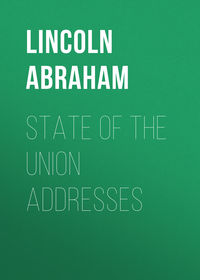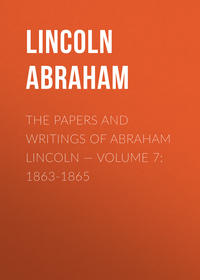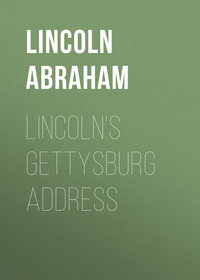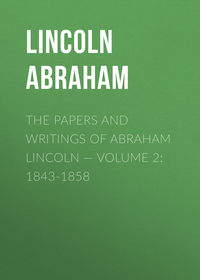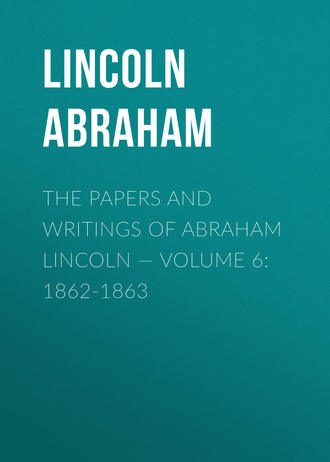 полная версия
полная версияThe Papers And Writings Of Abraham Lincoln — Volume 6: 1862-1863
The treaty with Great Britain for the suppression of the slave trade has been put into operation with a good prospect of complete success. It is an occasion of special pleasure to acknowledge that the execution of it on the part of her Majesty's government has been marked with a jealous respect for the authority of the United States and the rights of their moral and loyal citizens.
The convention with Hanover for the abolition of the state dues has been carried into full effect under the act of Congress for that purpose.
A blockade of 3000 miles of seacoast could not be established and vigorously enforced in a season of great commercial activity like the present without committing occasional mistakes and inflicting unintentional injuries upon foreign nations and their subjects.
A civil war occurring in a country where foreigners reside and carry on trade under treaty stipulations is necessarily fruitful of complaints of the violation of neutral rights. All such collisions tend to excite misapprehensions, and possibly to produce mutual reclamations between nations which have a common interest in preserving peace and friendship. In clear cases of these kinds I have so far as possible heard and redressed complaints which have been presented by friendly powers. There is still, however, a large and an augmenting number of doubtful cases upon which the government is unable to agree with the governments whose protection is demanded by the claimants. There are, moreover, many cases in which the United States or their citizens suffer wrongs from the naval or military authorities of foreign nations which the governments of those states are not at once prepared to redress. I have proposed to some of the foreign states thus interested mutual conventions to examine and adjust such complaints. This proposition has been made especially to Great Britain, to France, to Spain, and to Prussia. In each case it has been kindly received, but has not yet been formally adopted.
I deem it my duty to recommend an appropriation in behalf of the owners of the Norwegian bark Admiral P. Tordenskiold, which vessel was in May, 1861, prevented by the commander of the blockading force off Charleston from leaving that port with cargo, notwithstanding a similar privilege had shortly before been granted to an English vessel. I have directed the Secretary of State to cause the papers in the case to be communicated to the proper committees.
Applications have been made to me by many free Americans of African descent to favor their emigration, with a view to such colonization as was contemplated in recent acts of Congress, Other parties, at home and abroad — some from interested motives, others upon patriotic considerations, and still others influenced by philanthropic sentiments — have suggested similar measures, while, on the other hand, several of the Spanish American republics have protested against the sending of such colonies to their respective territories. Under these circumstances I have declined to move any such colony to any state without first obtaining the consent of its government, with an agreement on its part to receive and protect such emigrants in all the rights of freemen; and I have at the same time offered to the several states situated within the Tropics, or having colonies there, to negotiate with them, subject to the advice and consent of the Senate, to favor the voluntary emigration of persons of that class to their respective territories, upon conditions which shall be equal, just, and humane. Liberia and Haiti are as yet the only countries to which colonists of African descent from here could go with certainty of being received and adopted as citizens; and I regret to say such persons contemplating colonization do not seem so willing to migrate to those countries as to some others, nor so willing as I think their interest demands. I believe, however, opinion among them in this respect is improving, and that ere long there will be an augmented and considerable migration to both these countries from the United States.
The new commercial treaty between the United States and the Sultan of Turkey has been carried into execution.
A commercial and consular treaty has been negotiated, subject to the Senate's consent, with Liberia, and a similar negotiation is now pending with the Republic of Haiti. A considerable improvement of the national commerce is expected to result from these measures.
Our relations with Great Britain, France, Spain, Portugal, Russia, Prussia, Denmark, Sweden, Austria, the Netherlands, Italy, Rome, and the other European states remain undisturbed. Very favorable relations also continue to be maintained with Turkey, Morocco, China, and Japan.
During the last year there has not only been no change of our previous relations with the independent states of our own continent, but more friendly sentiments than have heretofore existed are believed to be entertained by these neighbors, whose safety and progress are so intimately connected with our own. This statement especially applies to Mexico, Nicaragua, Costa Rica, Honduras, Peru, and Chile.
The commission under the convention with the Republic of New Granada closed its session without having audited and passed upon all the claims which were submitted to it. A proposition is pending to revive the convention, that it may be able to do more complete justice. The joint commission between the United States and the Republic of Costa Rica has completed its labors and submitted its report.
I have favored the project for connecting the United States with Europe by an Atlantic telegraph, and a similar project to extend the telegraph from San Francisco to connect by a Pacific telegraph with the line which is being extended across the Russian Empire.
The Territories of the United States, with unimportant exceptions, have remained undisturbed by the civil war; and they are exhibiting such evidence of prosperity as justifies an expectation that some of them will soon be in a condition to be organized as States and be constitutionally admitted into the Federal Union.
The immense mineral resources of some of those Territories ought to be developed as rapidly as possible. Every step in that direction would have a tendency to improve the revenues of the government and diminish the burdens of the people. It is worthy of your serious consideration whether some extraordinary measures to promote that end cannot be adopted. The means which suggests itself as most likely to be effective is a scientific exploration of the mineral regions in those Territories with a view to the publication of its results at home and in foreign countries — results which cannot fail to be auspicious.
The condition of the finances win claim your most diligent consideration. The vast expenditures incident to the military and naval operations required for the suppression of the rebellion have hitherto been met with a promptitude and certainty unusual in similar circumstances, and the public credit has been fully maintained. The continuance of the war, however, and the increased disbursements made necessary by the augmented forces now in the field demand your best reflections as to the best modes of providing the necessary revenue without injury to business and with the least possible burdens upon labor.
The suspension of specie payments by the banks soon after the commencement of your last session made large issues of United States notes unavoidable. In no other way could the payment of troops and the satisfaction of other just demands be so economically or so well provided for. The judicious legislation of Congress, securing the receivability of these notes for loans and internal duties and making them a legal tender for other debts, has made them an universal currency, and has satisfied, partially at least, and for the time, the long-felt want of an uniform circulating medium, saving thereby to the people immense sums in discounts and exchanges.
A return to specie payments, however, at the earliest period compatible with due regard to all interests concerned should ever be kept in view. Fluctuations in the value of currency are always injurious, and to reduce these fluctuations to the lowest possible point will always be a leading purpose in wise legislation. Convertibility, prompt and certain convertibility, into coin is generally acknowledged to be the best and surest safeguard against them; and it is extremely doubtful whether a circulation of United States notes payable in coin and sufficiently large for the wants of the people can be permanently, usefully, and safely maintained.
Is there, then, any other mode in which the necessary provision for the public wants can be made and the great advantages of a safe and uniform currency secured?
I know of none which promises so certain results and is at the same time so unobjectionable as the organization of banking associations, under a general act of Congress, well guarded in its provisions. To such associations the government might furnish circulating notes, on the security of United States bonds deposited in the treasury. These notes, prepared under the supervision of proper officers, being uniform in appearance and security and convertible always into coin, would at once protect labor against the evils of a vicious currency and facilitate commerce by cheap and safe exchanges.
A moderate reservation from the interest on the bonds would compensate the United States for the preparation and distribution of the notes and a general supervision of the system, and would lighten the burden of that part of the public debt employed as securities. The public credit, moreover, would be greatly improved and the negotiation of new loans greatly facilitated by the steady market demand for government bonds which the adoption of the proposed system would create.
It is an additional recommendation of the measure, of considerable weight, in my judgment, that it would reconcile as far as possible all existing interests by the opportunity offered to existing institutions to reorganize under the act, substituting only the secured uniform national circulation for the local and various circulation, secured and unsecured, now issued by them.
The receipts into the treasury from all sources, including loans and balance from the preceding year, for the fiscal year ending on the 30th June, 1862, were $583,885,247.06, of which sum $49,056,397.62 were derived from customs; $1,795,331.73 from the direct tax; from public lands, $152,203.77; from miscellaneous sources, $931,787.64; from loans in all forms, $529,692,460.50. The remainder, $2,257,065.80, was the balance from last year.
The disbursements during the same period were: For congressional, executive, and judicial purposes, $5,939,009.29; for foreign intercourse, $1,339,710.35; for miscellaneous expenses, including the mints, loans, post-office deficiencies, collection of revenue, and other like charges, $14,129,771.50; for expenses under the Interior Department, $3,102,985.52; under the War Department, $394,368,407.36; under the Navy Department, $42,674,569.69; for interest on public debt, $13,190,324.45; and for payment of public debt, including reimbursement of temporary loan and redemptions, $96,096,922.09; making an aggregate of $570,841,700.25, and leaving a balance in the treasury on the 1st day of July, 1862, of $13,043,546.81.
It should be observed that the sum of $96,096,922.09, expended for reimbursements and redemption of public debt, being included also in the loans made, may be properly deducted both from receipts and expenditures, leaving the actual receipts for the year $487,788,324.97, and the expenditures $474,744,778.16.
Other information on the subject of the finances will be found in the report of the Secretary of the Treasury, to whose statements and views I invite your most candid and considerate attention.
The reports of the Secretaries of War and of the Navy are herewith transmitted. These reports, though lengthy, are scarcely more than brief abstracts of the very numerous and extensive transactions and operations conducted through those departments. Nor could I give a summary of them here upon any principle which would admit of its being much shorter than the reports themselves. I therefore content myself with laying the reports before you and asking your attention to them.
It gives me pleasure to report a decided improvement in the financial condition of the Post-Office Department as compared with several preceding years. The receipts for the fiscal year 1861 amounted to $8,349,296.40, which embraced the revenue from all the States of the Union for three quarters of that year. Notwithstanding the cessation of revenue from the so-called seceded States during the last fiscal year, the increase of the correspondence of the loyal States has been sufficient to produce a revenue during the same year of $8,299,820.90, being only $50,000 less than was derived from all the States of the Union during the previous year. The expenditures show a still more favorable result. The amount expended in 1861 was $13,606,759.11. For the last year the amount has been reduced to $11,125,364.13, showing a decrease of about $2,481,000 in the expenditures as compared with the preceding year, and about $3,750,000 as compared with the fiscal year 1860. The deficiency in the department for the previous year was $4,551,966.98. For the last fiscal year it was reduced to $2,112,814.57. These favorable results are in part owing to the cessation of mail service in the insurrectionary States and in part to a careful review of all expenditures in that department in the interest of economy. The efficiency of the postal service, it is believed, has also been much improved. The Postmaster-General has also opened a correspondence through the Department of State with foreign governments proposing a convention of postal representatives for the purpose of simplifying the rates of foreign postage and to expedite the foreign mails. This proposition, equally important to our adopted citizens and to the commercial interests of this country, has been favorably entertained and agreed to by all the governments from whom replies have been received.
I ask the attention of Congress to the suggestions of the Postmaster-General in his report respecting the further legislation required, in his opinion, for the benefit of the postal service.
The Secretary of the Interior reports as follows in regard to the public lands:
"The public lands have ceased to be a source of revenue. From the 1st July, 1861, to the 30th September, 1862, the entire cash receipts from the sale of lands were $137,476.2 — a sum much less than the expenses of our land system during the same period. The homestead law, which will take effect on the 1st of January next, offers such inducements to settlers that sales for cash cannot be expected to an extent sufficient to meet the expenses of the General Land Office and the cost of surveying and bringing the land into market."
The discrepancy between the sum here stated as arising from the sales of the public lands and the sum derived from the same source as reported from the Treasury Department arises, as I understand, from the fact that the periods of time, though apparently were not really coincident at the beginning point, the Treasury report including a considerable sum now which had previously been reported from the Interior, sufficiently large to greatly overreach the sum derived from the three months now reported upon by the Interior and not by the Treasury.
The Indian tribes upon our frontiers have during the past year manifested a spirit of insubordination, and at several points have engaged in open hostilities against the white settlements in their vicinity. The tribes occupying the Indian country south of Kansas renounced their allegiance to the United States and entered into treaties with the insurgents. Those who remained loyal to the United States were driven from the country. The chief of the Cherokees has visited this city for the purpose of restoring the former relations of the tribe with the United States. He alleges that they were constrained by superior force to enter into treaties with the insurgents, and that the United States neglected to furnish the protection which their treaty stipulations required.
In the month of August last the Sioux Indians in Minnesota attacked the settlements in their vicinity with extreme ferocity, killing indiscriminately men, women, and children. This attack was wholly unexpected, and therefore no means of defense had been provided. It is estimated that not less than 800 persons were killed by the Indians, and a large amount of property was destroyed. How this outbreak was induced is not definitely known, and suspicions, which may be unjust, need not to be stated. Information was received by the Indian Bureau from different sources about the time hostilities were commenced that a simultaneous attack was to be made upon white settlements by all the tribes between the Mississippi River and the Rocky Mountains. The State of Minnesota has suffered great injury from this Indian war. A large portion of her territory has been depopulated, and a severe loss has been sustained by the destruction of property. The people of that State manifest much anxiety for the removal of the tribes beyond the limits of the State as a guaranty against future hostilities. The Commissioner of Indian Affairs will furnish full details. I submit for your especial consideration whether our Indian system shall not be remodeled. Many wise and good men have impressed me with the belief that this can be profitably done.
I submit a statement of the proceedings of commissioners, which shows the progress that has been made in the enterprise of constructing the Pacific Railroad. And this suggests the earliest completion of this road, and also the favorable action of Congress upon the projects now pending before them for enlarging the capacities of the great canals in New York and Illinois, as being of vital and rapidly increasing importance to the whole nation, and especially to the vast interior region hereinafter to be noticed at some greater length. I purpose having prepared and laid before you at an early day some interesting and valuable statistical information upon this subject. The military and commercial importance of enlarging the Illinois and Michigan Canal and improving the Illinois River is presented in the report of Colonel Webster to the Secretary of War, and now transmitted to Congress. I respectfully ask attention to it.
To carry out the provisions of the act of Congress of the 15th of May last, I have caused the Department of Agriculture of the United States to be organized.
The Commissioner informs me that within the period of a few months this department has established an extensive system of correspondence and exchanges, both at home and abroad, which promises to effect highly beneficial results in the development of a correct knowledge of recent improvements in agriculture, in the introduction of new products, and in the collection of the agricultural statistics of the different States.
Also, that it will soon be prepared to distribute largely seeds, cereals, plants, and cuttings, and has already published and liberally diffused much valuable information in anticipation of a more elaborate report, which will in due time be furnished, embracing some valuable tests in chemical science now in progress in the laboratory.
The creation of this department was for the more immediate benefit of a large class of our most valuable citizens, and I trust that the liberal basis upon which it has been organized will not only meet your approbation, but that it will realize at no distant day all the fondest anticipations of its most sanguine friends and become the fruitful source of advantage to all our people.
On the 22d day of September last a proclamation was issued by the Executive, a copy of which is herewith submitted.
In accordance with the purpose expressed in the second paragraph of that paper, I now respectfully recall your attention to what may be called "compensated emancipation."
A nation may be said to consist of its territory, its people, and its laws. The territory is the only part which is of certain durability. "One generation passeth away and another generation cometh, but the earth abideth forever." It is of the first importance to duly consider and estimate this ever enduring part. That portion of the earth's surface which is owned and inhabited by the people of the United States is well adapted to be the home of one national family, and it is not well adapted for two or more. Its vast extent and its variety of climate and productions are of advantage in this age for one people, whatever they might have been in former ages. Steam, telegraphs, and intelligence have brought these to be an advantageous combination for one united people.
In the inaugural address I briefly pointed out the total inadequacy of disunion as a remedy for the differences between the people of the two sections. I did so in language which I cannot improve, and which, therefore, I beg to repeat:
"One section of our country believes slavery is right and ought to be extended, while the other believes it is wrong and ought not to be extended. This is the only substantial dispute. The fugitive-slave clause of the Constitution and the laws for the suppression of the foreign slave trade are each as well enforced, perhaps, as any law can ever be in a community where the moral Sense of the people imperfectly supports the law itself. The great body of the people abide by the dry legal obligation in both cases, and a few break over in each. This, I think, cannot be perfectly cured, and it would be worse in both cases after the separation of the sections than before. The foreign slave trade, now imperfectly suppressed, would be ultimately revived without restriction in one section, while fugitive slaves, now only partially surrendered, would not be surrendered at all by the other.
"Physically speaking, we can not separate. We can not remove our respective sections from each other nor build an impassable wall between them. A husband and wife may be divorced and go out of the presence and beyond the reach of each other, but the different parts of our country cannot do this. They cannot but remain face to face, and intercourse, either amicable or hostile, must continue between them. Is it possible, then, to make that intercourse more advantageous or more satisfactory after separation than before? Can aliens make treaties easier than friends can make laws? Can treaties be more faithfully enforced between aliens than laws can among friends? Suppose you go to war, you cannot fight always; and when, after much loss on both sides and no gain on either, you cease fighting, the identical old questions, as to terms of intercourse, are again upon you."
There is no line, straight or crooked, suitable for a national boundary upon which to divide. Trace through, from east to west, upon the line between the free and slave country, and we shall find a little more than one third of its length are rivers, easy to be crossed, and populated, or soon to be populated, thickly upon both sides; while nearly all its remaining length are merely surveyors' lines, over which people may walk back and forth without any consciousness of their presence. No part of this line can be made any more difficult to pass by writing it down on paper or parchment as a national boundary. The fact of separation, if it comes, gives up on the part of the seceding section the fugitive-slave clause along with all other constitutional obligations upon the section seceded from, while I should expect no treaty stipulation would ever be made to take its place.
But there is another difficulty. The great interior region bounded east by the Alleghenies, north by the British dominions, west by the Rocky Mountains, and south by the line along which the culture of corn and cotton meets, and which includes part of Virginia, part of Tennessee, all of Kentucky, Ohio, Indiana, Michigan, Wisconsin, Illinois, Missouri, Kansas, Iowa, Minnesota, and the Territories of Dakota, Nebraska, and part of Colorado, already has above 10,000,000 people, and will have 50,000,000 within fifty years if not prevented by any political folly or mistake. It contains more than one third of the country owned by the United States — certainly more than 1,000,000 square miles. Once half as populous as Massachusetts already is, it would have more than 75,000,000 people. A glance at the map shows that, territorially speaking, it is the great body of the Republic. The other parts are but marginal borders to it, the magnificent region sloping west from the Rocky Mountains to the Pacific being the deepest and also the richest in undeveloped resources. In the production of provisions, grains, grasses, and all which proceed from them this great interior region is naturally one of the most important in the world. Ascertain from statistics the small proportion of the region which has yet been brought into cultivation, and also the large and rapidly increasing amount of products, and we shall be overwhelmed with the magnitude of the prospect presented. And yet this region has no seacoast — touches no ocean anywhere. As part of one nation, its people now find, and may forever find, their way to Europe by New York, to South America and Africa by New Orleans, and to Asia by San Francisco; but separate our common country into two nations, as designed by the present rebellion, and every man of this great interior region is thereby cut off from some one or more of these outlets, not perhaps by a physical barrier, but by embarrassing and onerous trade regulations.





